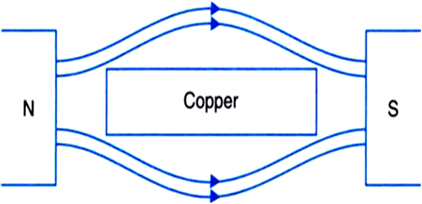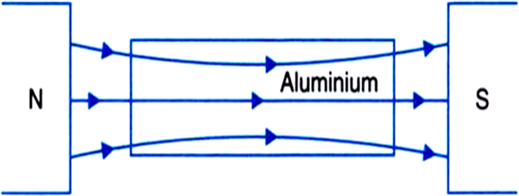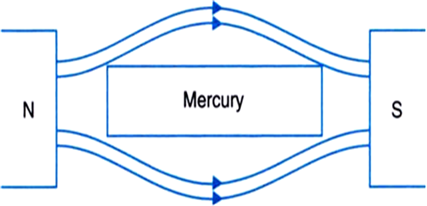Question
(a) Draw diagrams to depict the behaviour of magnetic field lines near a ‘bar’ of:
(i) copper
(ii) aluminium
(iii) mercury, cooled to a very low temperature (4.2 K)
(b) The vertical component of the earth's magnetic field at a given place is times its horizontal component. If total intensity of earth's magnetic field at the place is 0.4 G find the value of:
(i) angle of dip
(ii) the horizontal component of earth's magnetic field.
Solution
(a)
(i) Copper is a diamagnetic material. When a specimen of a diamagnetic material is placed in a magnetising field, the field lines are repelled and the field inside the material is reduced.

(ii) Aluminium is a paramagnetic material. When a specimen of a paramagnetic material is placed in a magnetising field, the magnetic field lines prefer to pass through the specimen rather than through air.

(iii) Mercury at a very low temperature (4.2 K) is diamagnetic material. The magnetic field lines are shown as

(b)
Here,
Vertical component is times the horizontal field.
And, B is the total intensity of earth's magnetic fiekd.
i.e.,
(i)
Angle of dip =
(i) Copper is a diamagnetic material. When a specimen of a diamagnetic material is placed in a magnetising field, the field lines are repelled and the field inside the material is reduced.

(ii) Aluminium is a paramagnetic material. When a specimen of a paramagnetic material is placed in a magnetising field, the magnetic field lines prefer to pass through the specimen rather than through air.

(iii) Mercury at a very low temperature (4.2 K) is diamagnetic material. The magnetic field lines are shown as

(b)
Here,
Vertical component is times the horizontal field.
And, B is the total intensity of earth's magnetic fiekd.
i.e.,
(i)
Angle of dip =
(ii) Horizontal component of earth's magnetic field
BH = B cos δ
H = 0.4 cos 60°



